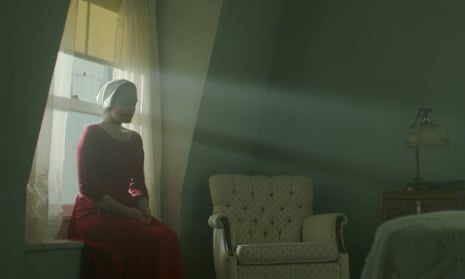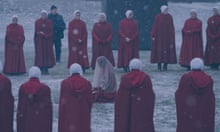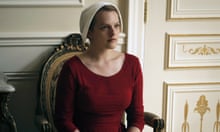In April 2016, when Hulu announced its 10-part adaptation of The Handmaid’s Tale, few allowed themselves to guess at the imminent revival in relevance of Margaret Atwood’s story. But her dystopia, an ultra-conservative republic cementing its hold on power through piousness and purges, has reignited the interest of readers, who have been drawing fresh parallels between Gilead and Trump’s America, and the novel topped the Amazon bestsellers list around the same time that signs at the global Women’s Marches asked to “Make Margaret Atwood fiction again”.
Few TV shows have arrived with such timeliness and under such a weight of expectation: not only did this need to be good television, but the accelerated pace of cultural and political change meant that it needed to be allegorical television too, that spoke to a tumultuous world.
It delivers on both counts. This is an unflinching vision of what Atwood called “speculative fiction”, and it looks stunning, all bleached and too-bright in the outside world, which masquerades as a pristine suburbia, and washed out and muted inside, where the oppressive reality of Gilead is played out in its true brutality. It has the slow, creeping dread of a horror movie, made all the more disquieting by the blood-red cloaks and the insistent and ominous score that pulses throughout. This is not a pleasant place to be, but nor is it entirely hopeless. There is a powerful resistance and seething rage, particularly in Elisabeth Moss’s Offred, that fills the story with energy and prevents it from ever slipping into any sense that this might be a slog. It’s also bold enough to allow flecks of humour in, even when it’s at its darkest.
Moss is the narrator, Offred, who has been turned into “breeding stock”. As she showed again and again in Mad Men, and in the Jane Campion thriller Top of the Lake, Moss has a particular way with what goes on under the surface. There are Eyes everywhere, and in a world where everyone turns on one another, nobody is to be trusted, but Moss still manages to show that there is rebellion inside her, even if it cannot be vocalised. She is blank and absent, but alive and defiant, often in the same instance. When Offred says, “I don’t know what I did to deserve this,” the delivery is devastating, because it is not dripping in self-pity, as it might be, but in sheer surprise, that this could happen to anyone, at all.
Tweaking a classic to include contemporary references to Uber and Tinder could have been ungainly, but it’s been done with confidence, and other elements of the story have been brought right up to date. The Plague of Infertility is now blamed on God’s disapproval of dating apps, as well as abortions and birth control. There are tales of refugees fleeing for the borders. There’s discussion, in a flashback, of campus sexual assault. It makes explicit the crime of “gender treachery” in the novel: Moira talks of an ex, taken in the “dyke purges”, while a pink triangle is painted on the hood of a hanged gay man. The hanging bodies, seen early on, are just a hint of the violence to come. There are beatings, shootings, electrocutions, and eyes ripped out. There is a violence in the way characters speak to each other and in the way Gilead’s many hierarchies are nailed into place.
There is violence, too, in the depiction of rape. A number of recent TV dramas have made a point of showing rape scenes, justifying them with a suggestion that they won’t shy away from the awfulness of such a crime by hiding it. But often this just doesn’t stand up, and in series like Game of Thrones, or even Netflix’s teen show 13 Reasons Why, scenes of rape have seemed unnecessarily explicit. Here, the ceremony by which the commander tries to impregnate Offred once a month is claustrophobic, nauseating and repulsive – the closeup on Moss’s face is particularly disturbing – but thankfully, it is not gratuitous, only horrifying, as it should be.
There has been a lot of new discussion about whether the TV version of The Handmaid’s Tale is a feminist story, just as there was around the novel. At a recent panel during the Tribeca Film Festival, some cast members, including Moss, appeared to clumsily steer it away from any “feminist” label, calling it “a human story, because women’s rights are human rights”. Though it caused a minor stink online, it seems likely that Moss, who has spoken before about her own feminism, was wording it badly. (Atwood has since defended the cast, and said they were trying to talk about the inclusivity of the show.) But even in the most cynical scenario, that this was a marketing narrative cooked up in some unholy boardroom so as not to scare off viewers who may balk at the F word, there is no escaping what The Handmaid’s Tale is. It’s a horror, and it’s a thriller, but it is, at its core, a warning, about how oppression can creep up on you, and what happens when women’s lives are no longer their own.
- The Handmaid’s Tale will premiere on Hulu today with a UK date to be announced







Comments (…)
Sign in or create your Guardian account to join the discussion